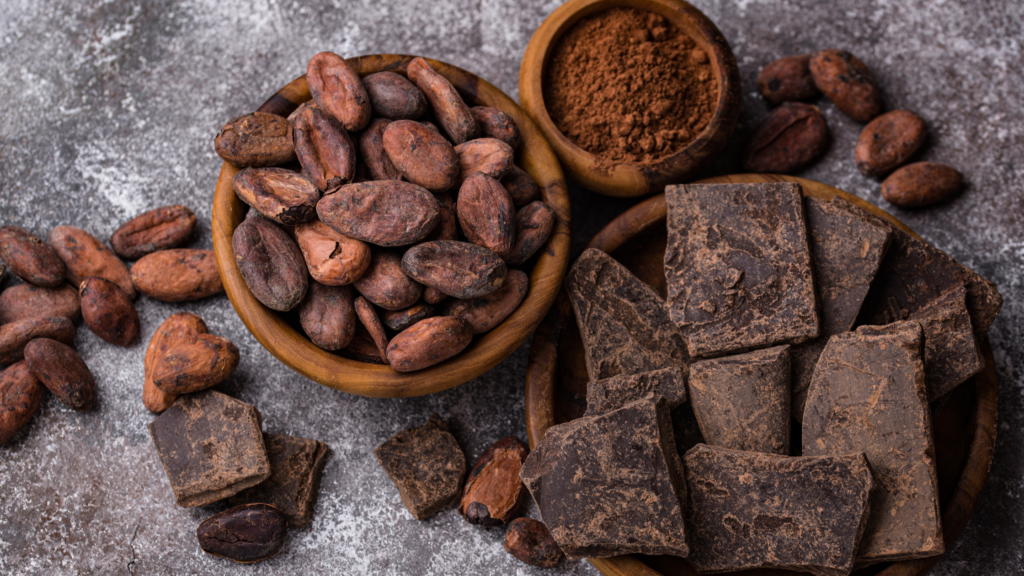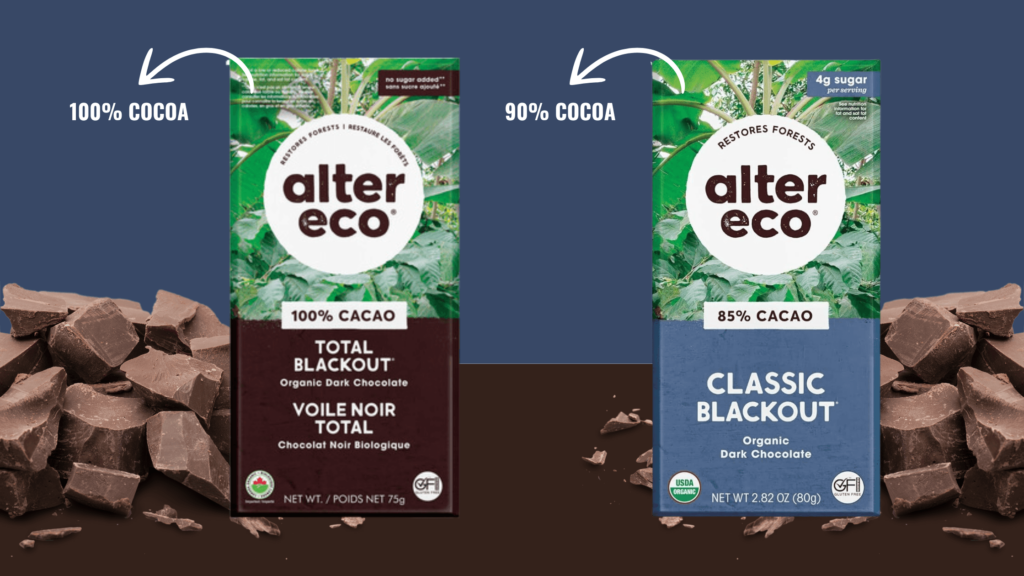Not all chocolate is created equal, and the right kind can actually be good for you. Dark chocolate, made with a higher percentage of cocoa, is packed with nutrients that can surprisingly boost heart, brain, and gut health. This treat deserves a spot in your wellness routine, from supporting heart health to improving brain function.
Quick look
- Dark chocolate containing 70% cocoa or more is rich in flavonoids, magnesium, and antioxidants, which support heart, brain, and gut health.
- High-quality dark chocolate can lower blood pressure, improve circulation, and reduce LDL cholesterol, enhancing cardiovascular health.
- Research shows that when consumed in moderation,dark chocolate may improve insulin sensitivity and lower the risk of type 2 diabetes.
- For maximum health benefits, opt for dark chocolate with minimal added sugar, 70% or higher cocoa content, and simple ingredients.
What makes dark chocolate…dark?

Dark chocolate is the grown-up sibling of your favorite childhood candy bar—more decadent, less sweet, and packed with cocoa goodness. But what sets it apart? Actual dark chocolate starts at 70% cocoa or more, with minimal sugar and no milk solids. That’s where the magic happens. And just because it says “dark” on the label doesn’t mean it’s healthy—chocolate with only 55% cocoa might still be loaded with sugar and missing the good stuff.
So, what makes dark chocolate a superfood superstar? It’s all about the powerhouse nutrients and compounds hiding in those cocoa solids:
- Flavonoids: Think of these plant-based antioxidants as little helpers for your heart and overall health. Specifically, flavonols (a flavonoid) improve blood flow, fight inflammation, and give dark chocolate its health-boosting reputation. The higher the cocoa content, the more flavonoids you’re getting.
- Magnesium: Dark chocolate is a surprisingly good source of magnesium, a mineral that keeps your muscles working, your heart healthy, and your bones strong. One bar of 70-85% dark chocolate can pack a hefty dose of this essential nutrient.
- Theobromine: This natural compound, a cousin of caffeine, gives you a gentle pick-me-up. It’s great for focus and mood without the jitters.
- Iron and zinc: These two minerals are like a dynamic duo for energy and immunity. Dark chocolate gives you a tasty way to fuel up and stay strong.
When it comes to dark chocolate, the higher the cocoa percentage, the better the benefits. It’s the treat that loves you back—just make sure you choose wisely.
Eating dark chocolate has health benefits
Diabetes
Dark chocolate isn’t just a delicious treat; it might help keep your blood sugar in check. Studies suggest that the flavonoids in dark chocolate can improve how your body handles insulin, reducing the risk of developing type 2 diabetes by up to 21%.
It gets better: The polyphenols in cocoa have been shown to improve glucose metabolism and fight oxidative stress, a significant factor in insulin resistance. So, enjoying a bit of dark chocolate helps your body manage blood sugar more effectively.
Of course, not all chocolate is created equal. To get these benefits, stick to dark chocolate with at least 70% cocoa and minimal added sugar. And remember, moderation is key—too much of a good thing can still lead to unwanted sugar spikes. Keep it high-quality and savor it.
Heart health
Dark chocolate isn’t just a tasty indulgence—it’s also a heart hero. Packed with flavonoids (natural antioxidants), this sweet treat can do wonders for your cardiovascular health. From improving blood flow to supporting overall heart function, dark chocolate brings more to the table than just its rich, delicious flavor.
Lowering blood pressure
Did you know dark chocolate could help keep your blood pressure in check? Studies show that eating just a small amount—about 6 grams daily—can lead to noticeable improvements. The secret lies in flavanols, natural compounds in cocoa that boost nitric oxide production. This signaling molecule helps relax your blood vessels, improving blood flow and lowering blood pressure. It’s like a tiny treat for your taste buds and your heart.
Improving circulation
Dark chocolate doesn’t just taste good—it helps your blood get where it needs to go. Thanks to flavanols, dark chocolate can improve the health of your blood vessels and boost circulation. For people with coronary artery disease, this can be a game-changer, reducing the risk of heart attacks and strokes. So, every bite of high-quality dark chocolate isn’t just a treat—it’s a little nudge toward better heart health.
Reducing the risk of hypertension
Enjoying dark chocolate regularly might do more than satisfy your sweet tooth—it could help prevent hypertension. High blood pressure is a common condition within the construction industry and a significant risk factor for heart disease, but the flavanols in dark chocolate have been shown to support healthy blood pressure levels.
Enhancing vascular function
Dark chocolate does more than just lower blood pressure—it helps your blood vessels stay strong and flexible. Flavanols in cocoa work to improve endothelial function, which is all about keeping your blood vessels elastic and healthy. Better vascular function means better overall heart health, making dark chocolate a delicious way to support your body from the inside out.
Cholesterol
Dark chocolate isn’t just a treat—it’s a heart-healthy superfood. Thanks to its rich supply of cocoa flavonoids, it can help improve cholesterol levels, giving your heart the support it needs to stay strong and healthy.
Increasing HDL (good cholesterol)
Here’s another reason to reach for dark chocolate: it can boost your high-density lipoprotein (HDL), or “good” cholesterol. HDL helps sweep cholesterol out of your arteries and back to your liver, where it can be processed and removed from your body. Studies even show that high-cocoa dark chocolate, rich in polyphenols, can make a noticeable difference—especially for people with type 2 diabetes.
Reducing LDL (bad cholesterol)
Dark chocolate doesn’t just boost the good—it also helps tackle the bad. Low-density lipoprotein (LDL) cholesterol, often called “bad” cholesterol, is known for building up in your arteries and leading to problems like atherosclerosis. Fortunately, the flavonoids in dark chocolate can reduce LDL levels and even prevent it from oxidizing—a key step in protecting your heart. Studies show that adding high-quality dark chocolate (70% cocoa or higher) can lower LDL and total cholesterol levels.
Inflammation
Flavonoids, those superstar compounds in dark chocolate, don’t just fight free radicals—they also help tame inflammation. By reducing inflammation in the body, dark chocolate can keep chronic diseases like heart disease and diabetes at bay.
Anti-inflammatory properties
Flavonoids in dark chocolate work behind the scenes, calming the body’s inflammatory pathways. They even step in to dial down specific proteins, like NF-κB, that can over-activate your immune response and cause unnecessary inflammation. By keeping these processes in check, flavonoids help reduce inflammation and promote a healthier, more balanced system.
Impact on overall health
Chronic inflammation is no joke—it’s linked to a host of serious health issues like heart disease, diabetes, and even certain cancers. The good news? Adding a bit of dark chocolate to your routine can help fight inflammation and support your overall well-being. Just remember, moderation is key! Stick to high-quality dark chocolate with at least 70% cocoa to maximize the benefits without overloading on calories.
Gut health
Dark chocolate is loaded with nutrients that can do wonders for your body, especially when packed with high cocoa content. Along with boosting heart health and brain function, it plays a surprising role in supporting a healthy gut.
A balanced gut
Dark chocolate isn’t just good for your taste buds—it’s excellent for your gut, too. Its powerful antioxidants help create a balanced gut microbiome by reducing inflammation and controlling harmful bacteria. Studies also show that dark chocolate exerts prebiotic effects, as shown by its ability to restructure the diversity and abundance of intestinal bacteria. By promoting a healthier digestive tract, dark chocolate gives you one more reason to indulge in moderation.
Improving Mood via the gut-brain axis
Did you know your gut and brain are in constant communication? Emerging research shows that the gut microbiome can influence mood and mental clarity through the gut-brain axis. A study from Seoul National University found that eating 85% dark chocolate daily improved mood in healthy adults, likely by promoting a healthier gut. So, the next time you feel a little off, a square of dark chocolate might lift your spirits.
Cognitive health
Memory boost
Regularly enjoying dark chocolate might do more than satisfy your sweet tooth—it could sharpen your memory, too. A recent study found that eating dark chocolate daily improved cognitive function and memory in healthy young adults. It’s a sweet way to keep your brain in top shape.
Improved focus and attention
Dark chocolate also serves as brain fuel. The flavonoids in cocoa have been shown to boost focus and processing speed. Research from the American Journal of Clinical Nutrition found that high-flavanol cocoa helped participants perform better on tasks requiring sustained attention. These benefits likely come from increased blood flow to the brain and the growth of new neurons, all thanks to those powerful flavonoids. Plus, they help protect existing brain cells from oxidative stress, making dark chocolate a faithful ally for brain health.
Chocolate and blood sugar
Here’s some sweet news: dark chocolate with high cocoa content has a low glycemic index (GI), meaning it won’t cause significant blood sugar spikes. A GI of around 23 provides a slower, more gradual release of energy compared to high-GI foods.
This is all thanks to its healthy fats and minimal sugars, which slow down the digestion of carbs. The flavonoids in dark chocolate can enhance insulin sensitivity, helping your body use insulin more effectively and regulate blood sugar levels.
How much should you eat?

When it comes to dark chocolate, less is more. Most experts agree that eating 1–2 ounces (30–60 grams) daily allows you to enjoy all the health perks without overloading calories or sugar. Eating more than that might tip the scale toward too many calories, so moderation is key.
Want to get the most out of your chocolate fix? Focus on quality over quantity. Here’s how to choose the best:
- Go for 70% or higher cocoa content: The higher the cocoa, the more flavonoids (and fewer sugars). If you can handle it, 85% or higher is even better.
- Skip the sugar: Look for dark chocolate with no added sugar or only a tiny amount. Labels like “unsweetened” or “naturally sweetened” are your best bet—but be sure to read the ingredients.
- Think raw or organic: Raw chocolate keeps more of its natural nutrients intact, while organic options are often free from unnecessary additives and responsibly sourced.
- Read the label: High-quality chocolate should contain simple ingredients like cocoa mass, cocoa butter, and maybe a touch of sweetener. Avoid fillers like hydrogenated oils or artificial flavors.
Enjoying a little dark chocolate each day can be both a treat and a health boost—just make sure to pick the right kind.
Bottom line
Dark chocolate isn’t just a sweet indulgence—it’s a health-boosting powerhouse. This treat packs serious benefits into every bite, from supporting your heart and sharpening your brain to keeping your gut happy and reducing inflammation. Plus, with its low glycemic index and ability to improve insulin sensitivity, it’s a surprising ally in managing blood sugar and reducing the risk of diabetes. So enjoy a little dark chocolate guilt-free—it’s a delicious way to support your well-being.
Want more health tips and insights like this? Subscribe to our newsletter and follow us on socialism media for expert advice, delicious recipes, and the latest trends in wellness.



1 comment